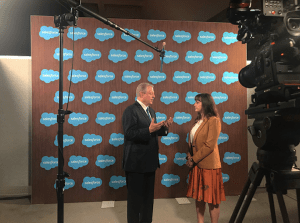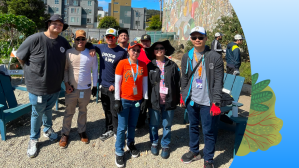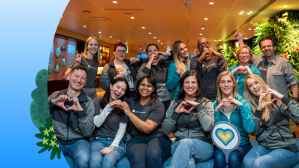Sunya Norman is Director of Sustainability at Salesforce, where she leads sustainability communications and stakeholder engagement initiatives. She is also a champion of Pledge 1%, an integrated philanthropy movement Salesforce cofounded to encourage other companies to leverage their resources for social impact.
Sunya is passionate about creating happy, healthy communities. She has an MBA from Presidio Graduate School, a BA from Brown University and over ten years of experience building sustainability programs at diverse organizations, ranging from nonprofits to Fortune 500 companies. Her best days involve bringing people together, problem solving and crafting stories to inspire change. Salesforce Newsroom caught up with her for an interview, marking Earth Day.
Can you tell us about your background? How did you start working in sustainability, and what brought you to Salesforce?
I’ve always been interested in combining my career with some sort of impact and purpose. I actually started my career in the nonprofit sector and transitioned to for profit after getting my MBA. I think that there’s great potential in business as a force for good. There are so many resources, so many skill sets and so much innovation in business, and that’s why I love the idea of the intersection of business and impact.
What does sustainability mean at Salesforce, and how has it evolved?
At Salesorce, sustainability means environmental sustainability. We’re fortunate to have many different programs in other departments focused on the social side of sustainability. My team’s work has evolved quite a bit over the past several years. Our formal department was created around 2005. It’s actually a really fun story. There was an employee at the company that at the time felt Salesforce should be doing more for the environment. And she raised her hand at an all hands, and basically asked our founders if she could start working on that full time. They gave her their blessing, and she really started it all.
We continue to build upon the early initiatives to create more robust programs throughout the business, integrating sustainability best practices into everything from our office design to our data center operations to how we think about energy procurement and employee engagement.
What is unique about Salesforce’s sustainability efforts?
I think what makes us unique is integrating sustainability into the core of our company’s culture and values. We say that the environment is a key stakeholder here at Salesforce along with the community and, of course, all the traditional stakeholders that a company has, like customers, employees and shareholders.
And what’s so special about sustainability here at Salesforce is that intention comes to life in tangible ways. An example is our employee green team, Earthforce. Those are our true cultural ambassadors. We have over 60 team leaders throughout the world, over 40 teams, and more than 6,000 members who volunteer their time outside of their day job to promote environmental sustainability, both within Salesforce and in their community.
How do you weave sustainability concepts into the culture of the company, overall?
The way that sustainability ends up in our culture is both bottom up and top down. I spoke about the bottom-up approach, the employee advocacy and engagement—there are thousands of employees throughout our company who are passionate about these issues. Then there’s a tremendous amount of leadership from executives throughout the company and from our department that crafts our environmental strategy.
One of the ways that we lead is by partnering with other companies and NGOs. Our company has joined up for a number of corporate pledges through an organization called We Mean Business, a global nonprofit coalition working with the world’s most influential businesses to take action on climate change.Through that organization we have committed to 100 percent renewable energy. We’ve also become a net-zero greenhouse gas emissions company. Most recently we’ve been focused on environmental, social, and government (ESG) reporting and transparency. We support the recommendations of the Task Force on Climate-related Financial Disclosures (TCFD) and are working to align with the initiatives like Accounting For Sustainability that elevate ESG reporting to the level of financial reporting.
We see this as really important to up level the discussion of corporate action around these issues. When we have great comparable data from different companies that our key stakeholders can look to and trust, then we can really drive global change. There are numerous other ways that Salesforce continues to engage, collaborate, and raise our voice to help articulate the business value of engaging in sustainability.
What are some of our recent sustainability achievements? Any specific metrics?
Definitely. First, it’s great to see our Co-CEOs, Marc Benioff and Keith Block, speak about their commitment to these important and timely issues. On of our recent key achievements includes using Salesforce technology for our environmental accounting, using our own technology, everything that Salesforce does best, to facilitate how the sustainability team tracks our environmental performance, manages our environmental footprint, optimizes the process, and drives actionable insights.
Another achievement is helping to lead the creation of the Step Up Declaration, which we announced at the Global Climate Action Summit in September 2018. It’s an initiative between Salesforce and over 20 other companies who committed to step up their own climate commitments and are looking for ways to use technology to accelerate climate action globally.
Last week we launched our latest annual Stakeholder Impact Report, covering programs and progress we made in FY19 to create a better, more equal world. This year we were able to add even more environmental, social and governance (ESG) metrics to the report, which is increasingly important as we are seeing a growing trend from customers and investors demanding more robust ESG disclosures.
What are some of the trends you’re seeing for 2019 in the sustainability space?
Thinking of Step Up and We Mean Business, as well as other initiatives that Salesforce and many other businesses are participating in, it’s evident that partnership and collaboration are key drivers of change. I think that there’s a widespread understanding that no one can do it alone. No one business. No one sector. No one individual. We all are joining together.
And technology in general is being seen as an accelerant. Climate change is an incredibly urgent issue, and we’re making progress working towards mitigation, but with technology we can bring our solutions to scale to more people, to more regions, to drive change faster.
What are some of the initiatives out there that companies interested in collaborating could sign on to?
We definitely encourage other companies to join us in the Step Up Declaration. The other initiative that we believe is really impactful is We Mean Business, which I mentioned. We Mean Business is a great organization that highlights how companies have set ambitious goals to drive climate action, what targets they have set and what it took to achieve them. It’s a platform that offers a menu for companies to choose from to make specific environmental pledges, or commitments.
For example, if you’d like to get more involved in government affairs and climate policy you can working with governments on implementing the Paris Agreement. RE100, which is a pledge that Salesforce has taken around achieving 100-percent renewable electricity, is really important for those of us who are in data centers and technology. There are also other pledges around responsible forestry or food and agriculture, so there’s something for everyone and I encourage everyone to explore We Mean Business and learn what pledge(s) is the best fit for you and your company’s mission.
Any other advice for companies who are starting out exploring sustainability? Are there books that have stood out to you or websites, people that are good to connect with?
It’s a good question. When thinking about creating a sustainability initiative at your company, align your strategy to your core competency. Think about what you do best as a company and apply that lens to impact.
For Salesforce that is technology and our leadership in convening other companies. We’re all about digital transformation, building connections, trust, customer success, innovation and equality for all. One way that we can bring people together is through our values and through sustainability.
But if you’re a transportation company, figure out how you can decarbonize distribution and logistics for not only your organization but for everyone. If your secret sauce is innovation, how can you catalyze more cleantech? If you’re skilled at supply chain management, how could you help others bring transparency and efficiency that lowers the negative environmental impact to their procurement? Every company has something unique to contribute.














